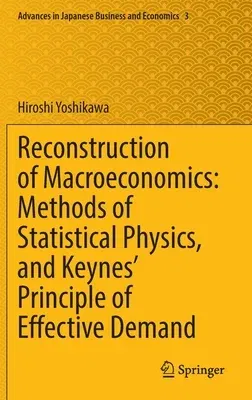This book explains how standard micro-founded macroeconomics is
misguided and proposes an alternative method based on statistical
physics. The Great Recession following the bankruptcy of Lehman Brothers
in September 2015 amply demonstrated that mainstream micro-founded
macroeconomics was in trouble. The new approach advanced in this book
reasonably explains important macro-problems such as employment,
business cycles, growth, and inflation/deflation. The key concept is
demand failures, which modern micro-founded macroeconomics has ignored.
"It (Chapter 3) captures analytically a good part of the intuition that
underlies the Keynesian economics of people like Tobin and me."
Robert Solow, Emeritus Institute Professor of Economics, Massachusetts
Institute of Technology, Nobel Laureate in Economics, 1987
"Professor Hiroshi Yoshikawa provides a unique synthesis of statistical
physics and macro-economic theory in order to confront the dismal
failure in economics and in finance to understand how an economy or a
financial market works, given the heterogeneous decision making of many
different individual interacting actors. Economics has failed in this
regard with the naive and often misleading concept of "representative
agents." The author presents many insights on the historical
development, concepts, and errors made by the most illustrious
economists in the past. This book should be essential readings for any
economics students as well as academic researchers and policy makers,
who should learn to bring back good-sense thinking in their impactful
decisions."
Didier Sornette, Professor on the Chair of Entrepreneurial Risks at
the Swiss Federal Institute of Technology Zurich (ETH Zurich)

